AlphaAlfa is a subsidiary of PaKHouse Brands and developed into an independent business from GrainCo Holdings, its father company, in 2015. It quickly grew into a recognised brand, with quality, as well as quantity, driving its ambitious and capable workforce. AlphaAlfa’s General Manager, Christie Engelbrecht, acknowledges that AlphaAlfa’s roots are still firmly nestled in the BKB business strategy, namely, to focus on closing the gap between farmer and market. AlphaAlfa is thus constantly on a quest to combine the various powers inside the BKB Group towards shared success by assisting where there is adversity. However, not only in the business but also for farmers, such as providing initial financial input assistance.
Engelbrecht describes AlphaAlfa as a significant node in the BKB network, intending on uplifting the businesses it engages with. From the very outset of their launch, the AlphaAlfa team embraced the fresh breeze of independence that came their direction. They hoisted the mainsail, prepared to respond to the trials posed by the lucerne market on a local scale, and even more significantly, to assert themselves as contenders in the global market.
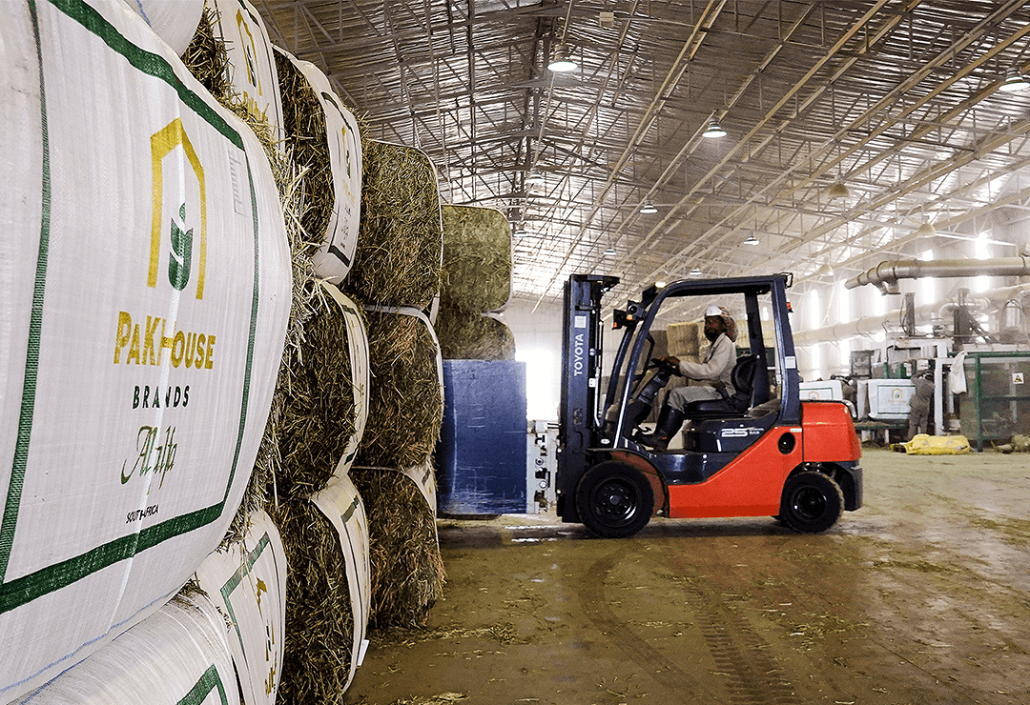
Alfalfa, also called lucerne (Medicago sativa), is a flowering herb, and member of the pea – or legume - family. Alfalfa crops are adaptable, flourishing in harsh environments and have a high nutritional value, making it a popular, and crucial, grazing crop worldwide. For cattle, especially dairy cows, it provides protein-rich feed, which is easily digested. The mature leaves are bitter to the human taste, but young sprouts are sometimes served in salads and dishes for their dietary benefits. Alfalfa may be harvested up to eight times a year, making it an exceptionally high-yielding crop. Being perennial, Alfalfa grows for several years, and the plants can stay in the fields for up to five years. This makes it ideal for crop rotation and many farmers choose to rotate successively between lucerne and corn or maize, which are annual crops.
Charl van Niekerk (Trader) explains that more and more farmers are starting to see themselves as custodians of the land they farm on. They accede to the importance of sustainable, regenerative, and conservational farming and aim their decision-making accordingly. From an environmentalist perspective, lucerne makes sense. In arable land where lucerne is planted, the soil is covered for a minimum of five years and thus is not left fallow for seasons to recover. During the five years, soil erosion is kept to a minimum and a healthy microbiome tends to develop. Thanks to its tap root system, alfalfa is drought-resistant and replenishes nitrogen levels deep down in the soil, further improving soil health over the longer term. After its final harvest, the alfalfa is cut down and ploughed into the soil where the rotting vegetable matter is incorporated into the soil to nourish the next crop.
Alfalfa seeds are sown in the late summer months, during March and April, with the seedlings emerging in about two weeks. The first cuttings are harvested after the winter months. The harvest must be processed soon after being harvested to protect it from rain. A harvest that has been exposed to rain quickly loses nutritional value, as well as acquiring an unappetizing smell, which deters the cattle from feeding. In turn, this hampers the animals’ milk production. As alfalfa’s nutritional quality lies in its dark green leaves, every part of the harvesting process that sheds leaves results in lowering the nutritional value of the end product.
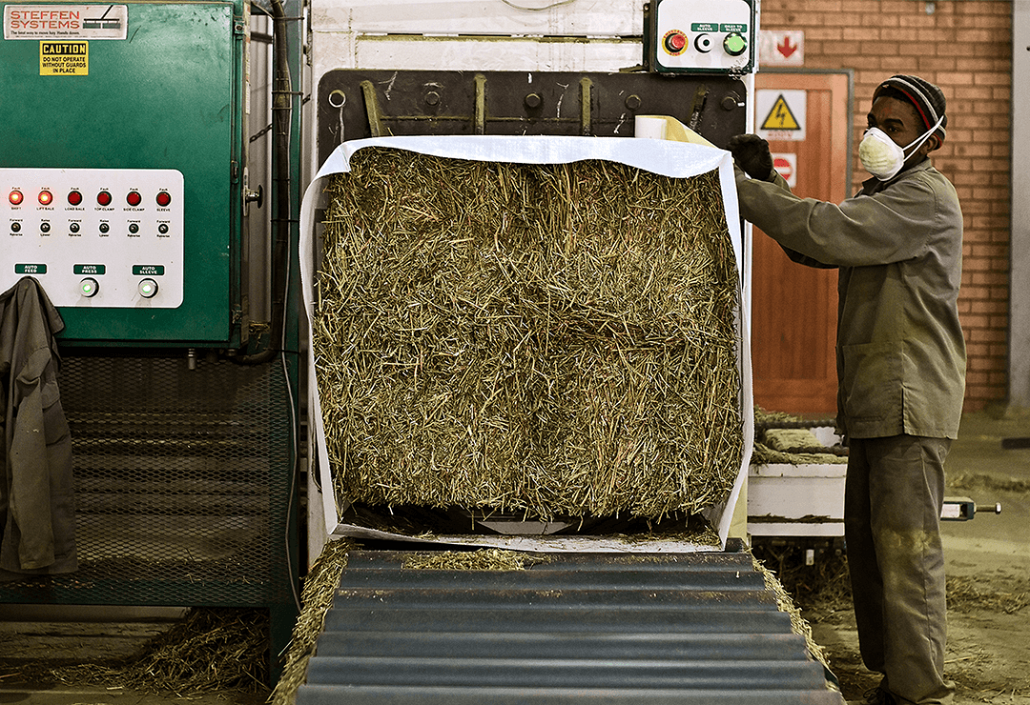
Careful transporting and handling of the crop from producer to processing facilities requires innovative thinking. Therefore, the AlphaAlfa team directed its attention towards maintaining a specific level of momentum. It implemented business practices that strengthen the integral relationship between producer and broker. For example, it used to be the practice to only accept the highest quality crop the farmer has to offer. Competitiveness in the market demands it as only the highest-grade produce would be processed and exported. But that would leave the farmer with less desirable products that nobody would want to buy.
In this respect, AlphaAlfa implemented one of its major changes. The company would deal with the complete crop the farmer has to offer, but the lucerne needed to comply with certain standards. The export market has stringent demands. Thus, the company implemented equally categorical quality control measures. Van Niekerk remembers that not all the farmers embraced the grading levels imposed by AlphaAlfa. However, the team were prepared. They engaged independent laboratories to promptly evaluate the grades, which conducted additional sample analyses, affirming the grade with scientific and definitive precision. Van Niekerk describes these initial stages as growing pains. In time, the producers accepted that integrity is the pivot around which AlphaAlfa is building its business.
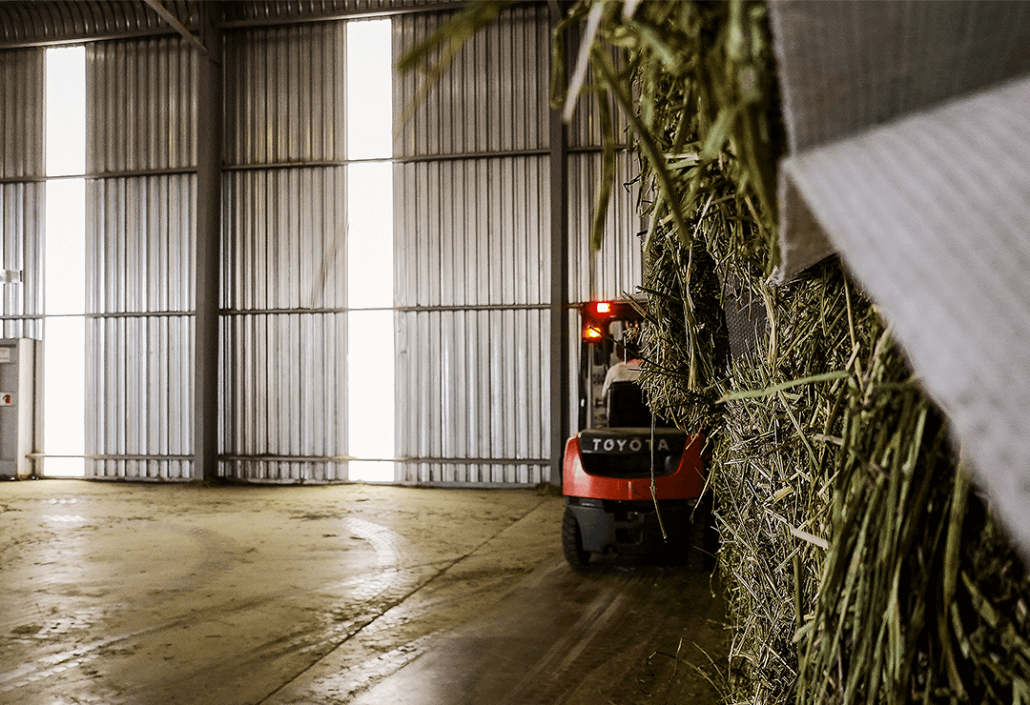
Engelbrecht stresses good relations through good communication with their clients – producers and traders. By conducting frequent farm visits the team gathers reliable and accurate information about dates when the farmers will be ready to harvest. This enables the AlphaAlfa team to make the necessary arrangements to collect the harvest and assist in other ways where needed. An essential part of AlphaAlfa’s operational strategy, is to foster healthy relationships with local reliable lucerne transporters. AlphaAlfa’s policy is based on prompt payment of transport companies.
A typical scenario could be as follows: Once AlphaAlfa is informed that a farmer is preparing to harvest, the team fulfils a major component of their pledge to outstanding service delivery, namely responsiveness. Transport for the harvest is dispatched and a loading team is deployed. On reaching the farm the loading team goes into action. Three members in each loading team are specifically tasked to verify the status of the harvest. Two to do moisture testing and a third to extract and analyse a sample for grading. The result of the analysis is shared immediately with the producer. With this on-the-spot analysis and grading done the specific crop is ready for swift transport to a safe storage facility. So, getting the alfalfa off the land after cutting, takes priority. For this reason, AlphaAlfa loads throughout the harvesting season, weekends included and delivers the product to distribution centres at Jakobsdal, Hoopstad and Dorstfontein. Storage of harvested material at the Dorstfontein plant’s facility is another major advantage to farmers and AlphaAlfa itself. Previously the product had to be moved directly from the farm to the harbour for shipping, to prevent exposure to rain due to its devastating effect on the quality and the income for the producer.
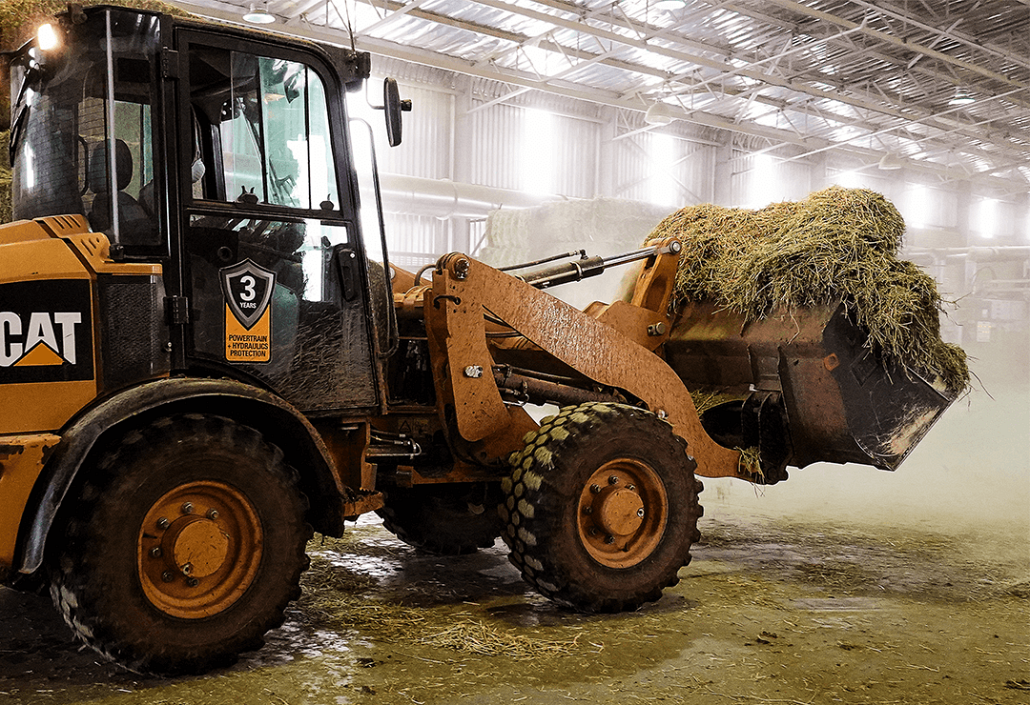
At Dorstfontein the produce can safely be processed, before being shipped. The Dorstfontein plant, with a staff of 20 people, runs 24 hours per day from October to March of the following year, with the activity level peaking in December.
AlphaAlfa invested in a static hay press about six years ago and had it installed at the Dorstfontein plant. The huge interlink trucks arrive at the plant, filled with alfalfa bales from the producers. The higher-grade alfalfa bales (Prima Supreme Grade 1) are moved to the static hay press. Here the lucerne is pressed into double compressed bales (DC bales) and enveloped with branded sleeves. The wrapping of each double compressed bale is packaged in a striking sleeve bearing the company logo and product information. This kind of packaging simplifies handling on arrival at international ports. Since produce information relating to origin and grading is printed on the sleeve, there are fewer steps to follow before the product can be released into the foreign market.
DC bales are compact, smaller in volume and thus more cost-effective for shipping, for which cost is determined by volume rather than by weight. The smaller proportions have also been optimised for fitting into a shipping container. This development has given the company a slight advantage over its competitors, being able to ship 25 tonnes per container as opposed to the standard 20 tonnes.
The Prima Supreme Grade 1 product is exported, with most of the 40 000 tonnes sent to the Middle East and China. Up to four interlink trucks, with loads of up to 35 tonnes each, leave the plant daily for export via the Durban harbour.
Additionally, Dorstfontein Grades 2 and 3 alfalfa are prepared for the local market at the hammer mill. This lower-quality feed will be milled, mixed, and sold as silage. Roughly 4 trucks loaded with feedbags leave the plant daily.
In 2023, the AlphaAlfa team will continue to focus on consistently delivering sustainable amounts of product to the static hay press. A numeric value of this aim is 30 000 tonnes of processed products in 2023. Load shedding however has become the major spoke in the production wheel. During stage 4 load shedding, the plant loses about 25% of its production capacity and on stage 6, losses may be as high as 30%. The team is looking at possible alternative solutions that would supply the Dorstfontein plant with 1.2MW of renewable energy to cover its 800kVA requirement. This alternative source would result in a significant financial expense but would help to secure a source of energy at a sustainable level for future production. To add insult to injury, Covid-19 with its global logistic impact, was barely overcome when ports around South Africa have seen their share of internal issues.
In July 2021, Durban experienced widespread violence and looting which added to the logistical nightmare. In April 2022, the Natal province was hit by heavy rains, which led to widespread damage to infrastructure due to flooding and mudslides. Finally, in October 2022, the industrial action taken by the South African Transport and Allied Workers Union (SATAWU) and United National Transport Union (UNTU) affected the functionality of many of the South African ports.
These factors made the exporting of South African goods a tedious and often impossible task. Amidst such a reality, the Dorstfontein storage facility could well be the answer to a dire market situation. By further optimising the plant in years to come, AlphaAlfa believes it will reach its aim of improved quality and higher volumes.
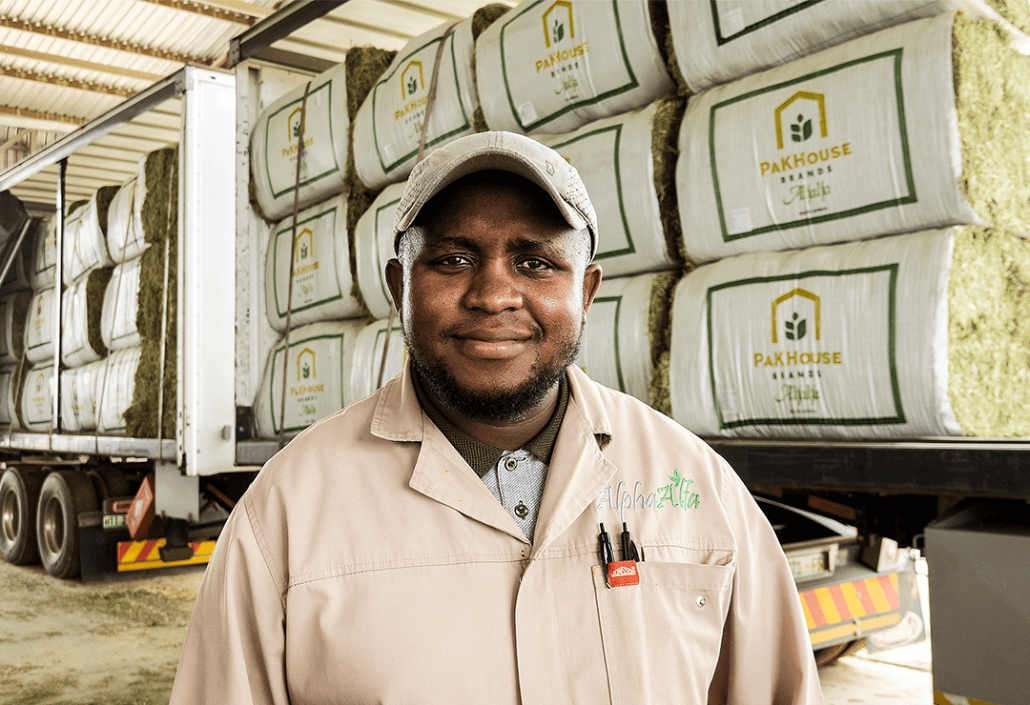
With a mere two months in his position as the company director, Engelbrecht praises the resourcefulness and determination of his crew, “they are such a great asset to the industry.” Engelbrecht, who himself comes from an agricultural and financial background, understands the importance of relationships in business. The connection is to be made in face-to-face engagements. In the alfalfa business, this implies “getting into your bakkie and driving to the farm. Having a cup of coffee and discussing the farming business with the lucerne producers and hearing about their challenges.”
Engelbrecht perceives a primary element of the AlphaAlfa team’s role as being educational. For the local alfalfa industry to thrive and be sustainable in the export market, producers need to step up to the plate. Both existing and budding producers need to understand how important quality and decisions pertaining to the grade of alfalfa production are to the market. To meet the need for authoritative information, AlphaAlfa plans a series of information sessions, aimed at opening the discussion on sustainability and quality control.
He also recognises the fundamental role that service delivery plays in a company’s success. “You can never rest on your achievements, thinking that the producers are a sure thing. You could be working with a particular farmer for years, buying his produce year after year, but one experience of poor service delivery has him looking elsewhere for a better buyer. We simply cannot afford poor service delivery” he says. Service delivery and communication go hand in hand. Production figures are discussed every month and distributed to the relevant departments within the company. The market information about alfalfa prospects is also shared with the producers. He feels that this engagement forms a basis for talks about the prospects for lucerne sales and planning. Recently, as the global tendency triggered lower prices for lucerne, up-to-date information assisted the producers to plant accordingly in the following season.
The management team considers feedback to its traders and personnel as essential. Acknowledgement is given where there had been growth, and any areas of concern are treated with a developmental focus. Harvest and production statistics are treated with deliberate transparency, “Our dirty laundry is hung out on the board for the whole team to see – as much as we are constantly reminded of our progress.” The management team believes the best way to quash any uncertainty and doubt about the business and the market, is by sharing information. “When people know what is going on, rumours can’t get a foot in the door.”
Lush green hectares upon hectares of lucerne, sprinkled with a sea of purple flowers may be a sight to behold – burning these fields into monetary value needs the input of a dedicated business. In South Africa, BKB answered the call. And at the heart of it is the AlphaAlfa team. Management understands that the team functions under tremendous pressure. Mutual understanding and support strengthen the team, and there is no discomfort in asking for help. The relatively young management team is completely present in their engagements with the crew, prioritising the team's mental well-being through honest care. Regular plant visits with an ear to the ground, reading the working atmosphere and identifying possible focus areas, are at the core of this business. “Listen with a compassionate ear,” to all who may speak. From the cleaners, the forklift operators, foremen to the office personnel, all equally comfortable discussing their experience at work. It seems that everyone grasps the aim of these openhearted conversations: to improve life, not just for the life-giving producers, but also for the life-sustaining workers that have AlphaAlfa's interests at heart.